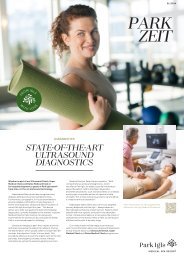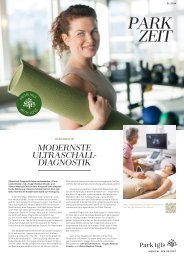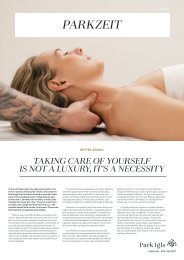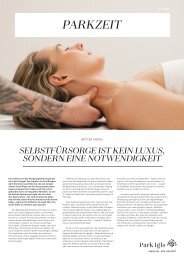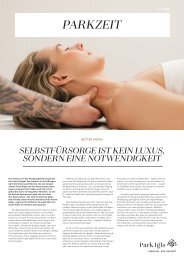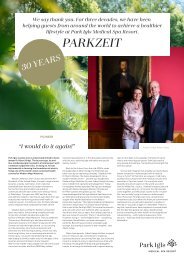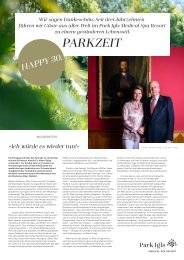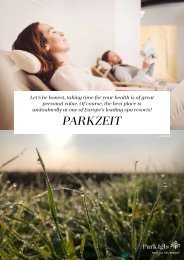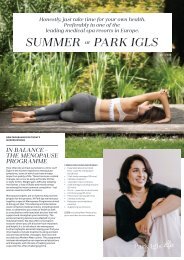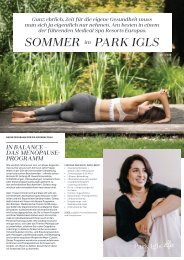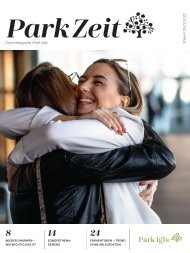Parkzeit 2021-2 (EN)
Guest magazine Park Igls
Guest magazine Park Igls
You also want an ePaper? Increase the reach of your titles
YUMPU automatically turns print PDFs into web optimized ePapers that Google loves.
CRISIS LOSERS<br />
Four, seven and ten are the challenging ages of<br />
her beloved children. And her? She’s married,<br />
full of life, and wholly engaged in professional<br />
life. She refers to herself as both lucky and<br />
successful – in the prime of her life so to speak.<br />
This strong woman knows only of financial worries<br />
or existential fears from stories. She enjoys her<br />
freedom of choice when it comes to travel and<br />
holidays and knows that her future is carefree.<br />
But then the corona pandemic hits and her life as<br />
she knew it was turned upside down as things<br />
took a complete 180. What this would truly mean<br />
and with what force it would throw her off her<br />
usual track, she had no idea at that time. The ease<br />
with which she lived and mastered her life until<br />
now was suddenly gone.<br />
It was replaced instead with school closures,<br />
distance learning, curfews and restrictions as well<br />
as feelings of confinement or being locked up<br />
for many months. It was all suddenly too much,<br />
she affirms. In addition to her professional life,<br />
she has to function as a housewife, cook, teacher,<br />
cleaning lady and mum. Every day, seven days a<br />
week. Suddenly, she was unable to manage or to<br />
even get space.<br />
She was left alone with her tasks, she says, as her<br />
husband was of no help. Without distance and<br />
her usual freedoms, she fell into a state of constant<br />
stress. And before long, sleeping disorders, violent<br />
migraine attacks, exhaustion, anxiety disorders<br />
and panic attacks followed. These are typical<br />
reactions to severe stress and adjustment<br />
disorders. Anxiety and depressive disorders were<br />
diagnosed later. Accepting help never came easy<br />
for her. She’s the type of person who loves to help<br />
others, but too often forgets about herself in the<br />
process. Because she couldn't get going on her<br />
own and the pressure of suffering was too high,<br />
she sought psychological help. Fortunately, such<br />
help was available. And she accepted it. “I'm a crisis<br />
loser,” she says, “but I am fighting my way out of it.<br />
It will make me more resilient and bring back my<br />
quality of life.”<br />
close communication, distance for unfamiliarity.<br />
Everyone knows this instinctively. Just imagine the<br />
following greeting situations: a particularly intimate<br />
hug from your best friend whom you haven't seen<br />
for a long time or a handshake to greet a new<br />
business contact. Such gestures make all the<br />
difference."<br />
WHY DO WE LIKE HUGGING SO MUCH?<br />
"Closeness is a part of our lives from birth. I'll<br />
even go so far as to say proximity is vital to our<br />
survival. Ideally, when we are held, we feel safety,<br />
affection, perhaps love, comfort or trust.<br />
Everything we like to feel," says Thomas Blasbichler.<br />
Are we going to forgo hugging? "Never!"<br />
“Closeness is<br />
part of our lives<br />
from birth”<br />
Breathing<br />
From the moment we first cry<br />
when we are born to the often quoted<br />
very "last breath": Breathing<br />
is something we do throughout<br />
our whole lives.<br />
Thomas Blasbichler (MA)<br />
Clinical and health psychologist, sports psychologist,<br />
specialist in prevention, coach<br />
10<br />
GIVE ME A HUG!<br />
BREATHING 11



